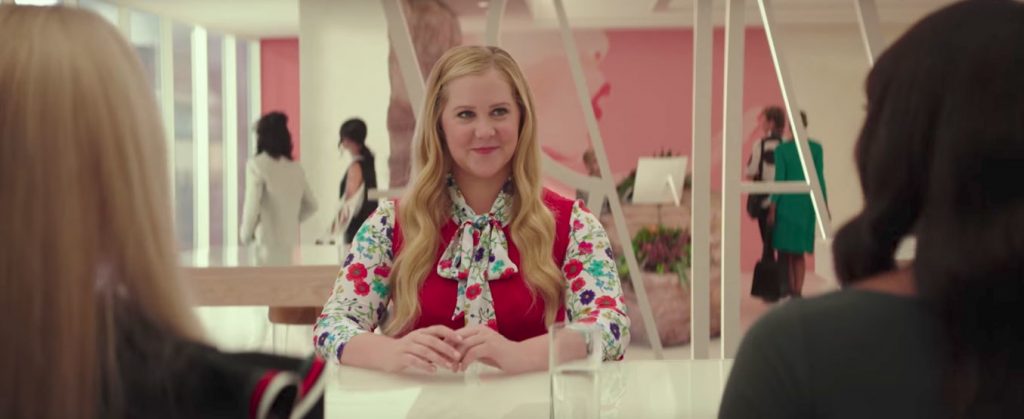Written and Directed by Abby Kohn and Marc Silverstein | 110 min
Amy Schumer is a brilliant, gifted comic writer and actor. She shines especially in her stand-up and on her TV series, Inside Amy Schumer, where she explores issues of sex, intimacy, and especially the way American women see themselves. This should make I Feel Pretty kind of a slam dunk for her, even though she didn’t have a hand in the script—this story of Renee, a New Yorker insecure about her looks who bangs her head and wakes up with a sudden confidence that changes her life.
Schumer is, in fact, great in this. As Renee she’s winning and funny as a slightly dense cosmetics company employee who aspires, very sincerely, to be the receptionist at the head office. She’s tight with her friends (Aidy Bryant and Busy Philipps), but can’t quite see past her perceived flaws—as is evident in the way she’s awed by model/actress Emily Ratajkowski, playing a woman Renee meets at her fitness class. Once Renee’s had that knock to the head she’s transformed (on the inside at least). She picks up a friendly dude (Rory Scovel) at the dry cleaners, goes after that job, lands it and impresses the bosses at the company (including Lauren Hutton, Tom Hopper, and as the support MVP, Michelle Williams).
There’s a real opportunity here to take sharp shots at the hypocrisy of the beauty industry and the selling of body image, but after a solid set-up, the film never gets there. While Renee does skewer a few shallow perceptions around beauty—her enthusiasm at a bikini contest is a highlight—there’s something twisted about her dream to be part of the very community, the very industry, that feeds her insecurity. There’s some lip service paid to how her sudden confidence makes her neglect what’s actually important to her (her friends and values), but what actually manifests is her talent for reaching people who want to feel beautiful through mascara. Maybe that’s irony, but it feels like a big, steaming pile of hypocrisy.
When Renee rises to power, at the big, supposedly emotional come-to-Jesus scene—with her friends present, though there’s no reason for them to be—she hawks a cosmetic to a crowd of “average” girls who shop at Target, which becomes a life-counselling session. The film’s telling us that because she’s not exceptional, Renee’s able to tell the truth of how we’re all insecure about something, so we might as well be the best people we can be.
It’s a great message, but the fact she sells empowerment as a product kills the fun.










